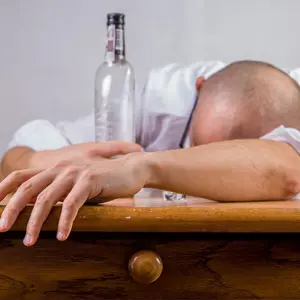According to recent data published by the National Institute on Alcohol Abuse and Alcoholism (NIAAA), the incidence of regular drinking among college students has remained stable. However, binge drinking has increased substantially. As a consequence, the frequency of blackouts, alcohol overdoses, motor vehicle accidents, serious injuries, sexual assaults, poor academic performance, and death have also increased.
That said, moderate alcohol consumption has been shown to have certain health benefits. According to the Mayo Clinic, moderate alcohol use may reduce your risk of developing heart disease, reduce your risk of an ischemic stroke, and potentially reduce your risk of developing diabetes.
Alcohol and Sexual Assault
It’s estimated that more than 600,000 students are assaulted every year by another student who has been drinking. Risk factors increase substantially with heavy drinking, but there doesn’t seem to be any correlation between age and risk, within the age range of 18-24 years old. In other words, for all ages studied (18 to 24), the risk of sexual assault increases with alcohol consumption.
Roughly 74 percent of people committing assault are under the influence of alcohol, while 55 percent of the victims are also under the influence. One important factor to consider is that most rapes and instances of sexual assault occur between two people who know each other, and the incident commonly occurs in an otherwise familiar place, like a home or college dorm.
Alcohol Abuse and Dependence
Another potential problem of chronic alcohol consumption is the dependency it may create in young adults. About 31 percent of college students would meet the requirement for a proper diagnosis of alcohol abuse in the past 12 months. Another 6 percent would be considered dependent on alcohol.
Many argue that alcohol should be allowed on campus for those students who are of legal age. However, some argue that allowing alcohol on campus may encourage underage drinking, lead students to develop a dependency or drinking problem, or create abuse-related problems and binge drinking that could have significant future negative impacts on health.
How Living Arrangements Affect Drinking Habits
Living arrangements, and peer pressure, dramatically influence a student’s susceptibility to drinking. Studies show that drinking varies based on where students live. For example, drinking rates are highest in fraternities and sororities. On-campus housing (dorms or residency halls) is the next-highest risk factor for drinking, followed by off-campus housing, like an apartment. Not surprisingly, students who live at home drink the least.
Effects on Grades and Performance
Study after study shows that alcohol consumption has a negative effect on most measures of performance. For example, this study demonstrates that the byproduct of alcohol, acetylaldehyde, can damage brain cells and directly reduce testosterone production in the cells of rats.
And, finally, about 25 percent of college students self-report having problems in school because of alcohol consumption,according to the NIAAA. Problems range from missing class the day after a night of binge drinking, falling behind in class, performing poorly on tests or term papers, and an overall lowering of grade point average.
Standard Drinks and Alcohol Equivalence
College students consume about 1 drink every hour while at a party.
What constitutes a “standard drink?” In the U.S., a standard drink is equal to:
• 12 ounces of beer (5% alcohol content) or;
• 8-ounces of malt liquor (7% alcohol content) or;
• 5 ounces of wine or mead (12% alcohol content) or;
• 1.5 ounces of 80 proof liquor (distilled spirits, like gin, vodka, rum, and whiskey. 40% alcohol content)
The amount of alcohol in the drink, regardless of the source, is what determines a “standard drink.” According to the CDC, a standard drink is equal to 14 grams or .6 ounces of pure alcohol.
If an alcoholic drink contains more or less by volume, students must take this into account when estimating their total alcohol consumption.
The Numbers Don’t Lie
In the U.S., all states have zero-tolerance laws which make it illegal for people under the legal age to obtain and consume alcohol. And yet, according to the 2013 National Survey on Drug Use and Health, there are an estimated 8.7 million underage drinkers in the U.S., many of which are college students.
While alcohol is often consumed on college campuses, it poses special risks that both students and parents should be aware of. In addition to negatively affecting academic performance, alcohol abuse can lead to serious injuries and long term health issues.
Additional Resources:
College Student Alcohol Drinking Statistics — Static Brain is an online resource for unbiased statistics, created by professional mathematicians and statisticians who are passionate about numbers.
Student Statistics On Alcohol Consumption and Abuse — The Student Statistics On Alcohol Consumption and Abuse Lists important statistical information about alcohol use on campus.
NIH On Underaged Drinking — This resource provides parents and student with important information about the prevalence of underage drinking and its impact on performance.
The National Institute on Alcohol Abuse and Alcoholism — This institute conducts research on the impact of alcohol use on human health.
Center For Science In The Public Interest — CSPI is a public policy outreach organization, aimed at raising awareness and influencing the discussion about the consequences of drinking.
Sober College — Sober College is a drug and alcohol rehabilitation center that helps young people with substance abuse problems.



